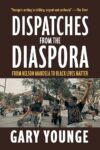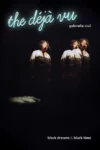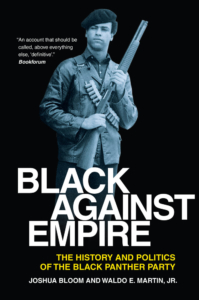 This is the second part of an interview with Joshua Bloom, author of Black Against Empire: The History and Politics of the Black Panther Party. In the first part of the interview we discussed the legacy of the Panthers for contemporary movements such as Occupy and Black Lives Matter. In this second part, we move on to discuss the substance of the Panthers’ political strategy, how that is often overshadowed by focusing on the aesthetics of the movement, and how the Panthers were able to leverage broader institutional cleavages in American life to force real concessions from the state.
This is the second part of an interview with Joshua Bloom, author of Black Against Empire: The History and Politics of the Black Panther Party. In the first part of the interview we discussed the legacy of the Panthers for contemporary movements such as Occupy and Black Lives Matter. In this second part, we move on to discuss the substance of the Panthers’ political strategy, how that is often overshadowed by focusing on the aesthetics of the movement, and how the Panthers were able to leverage broader institutional cleavages in American life to force real concessions from the state.
The first part of the interview can be found here.
Michael Schapira: I went to a screening of Black Panthers: Vanguard of the Revolution and two things really struck me. First, when Fred Hampton made his first appearance on screen, people cheered. Second, Cornel West and Harry Belafonte were sitting in the back and at the end of the Q & A West exhorted the audience to appreciate the politics of the Panthers. Whether it’s Hampton being treated as a folk hero or a prominent African-American scholar openly embracing the Panthers, it seems like the Party is having something of a resurgence, or maybe to put it prosaically has become fashionable or more mainstream. Do you also have a sense that this is the case, and if so do you have any wild speculations on why that might be?
Joshua Bloom: I think there is some part of it that goes back to what we were talking about before, about how we were able to write this book. Historians, unlike sociologists who write about contemporary events, have this 20-year minimum rule. You can’t really do history about anything that happened within the last 20 years because it’s too controversial and people are too attached to it, and that’s related to the idea that you have younger generations that don’t have these attachments, who haven’t been affected by organized vilification as much. So some of what you see may be the result of cumulative persistence from the people who wanted to recover the story of what was happening on the ground with the Black Panther Party and Black Power more generally.
But I think there is another part of it as well. There are both race and class dimensions to it. We are in a time of vast and growing inequality. If you think about black America—a hole has been ripped in the veil by Black Lives Matter. There’s been this ideology of a post-racial society and the end of racism: Obama has been elected president, “American society has overcome, and King’s dream has been fulfilled.” We have a monument to King in the nation’s capitol, and a national holiday. But look at any of the indexes. Think about median family assets, not income but assets, for black families in the United States. In the year 2000, black families had 1/10 the median family assets as white families. So the median white family had 10 times the assets of the median black family. And what happened since 2000, as the myth of the post-racial society has spread, is that that discrepancy has actually doubled. So today the median white family actually has 20 times the assets of the median black family. Or think about incarceration. The prisons have tripled, and sure more white people have been locked up as well, but the rate of incarceration for black people, black men, is more that seven times the rate of incarceration for white men. So the prison system has expanded, but that has had a much vaster impact on the character of black America than it has had anywhere else. You can look at all different kinds of indexes. There were pretty profound effects of Affirmative Action on access to public institutions of higher education, and with prop 209 in California and a number of similar measures across the country that have dismantled Affirmative Action at most of the best public universities, black participation in the university, and especially elite public universities, has been decimated. It’s like a third of what it was.
I’m talking about race in the US here, but internationally and domestically the level of inequality, if you look at wages and income, has mushroomed in the last seven decades. We are in a moment when, despite the mythology of post-racism, people are hurting. So I think many of the things that the Party was fighting for, that were not won by formal desegregation and the dismantling of Jim Crow, remain important today. I think part of what you see in Black Lives Matter is a young generation of activists starting to break through and figure out ways to call into question some forms of contemporary racism. It’s not like anyone who has lived or worked extensively in black communities is surprised by these killings. Horrified yes, but everybody knows this is the way police work in black communities. What’s happened with this mobilization and the social networking exposure of these videos, those discrepancies have been more broadly exposed to people who had been living on the other side of the veil.
Now, where any of these movements go is not something that is pre-determined structurally. What people do matters. What the movement does matters. What authorities do matters in helping to determine the course of events. I don’t think these things are pre-set. But I think part of what you’re seeing with the resurgence of interest in the Party is a reflection of people feeling very similar kinds of oppression. And that oppression belies widespread mythologies about ascendance and the victory of American democracy. This contradiction is reminiscent of the moment in which the Black Panther Party emerged. The mainstream ideal was that the Civil Rights movement was a reflection of the triumph of American democracy, and the triumph over racism, and yet the reality on the ground was very different. So there are important parallels, while there are also important differences.
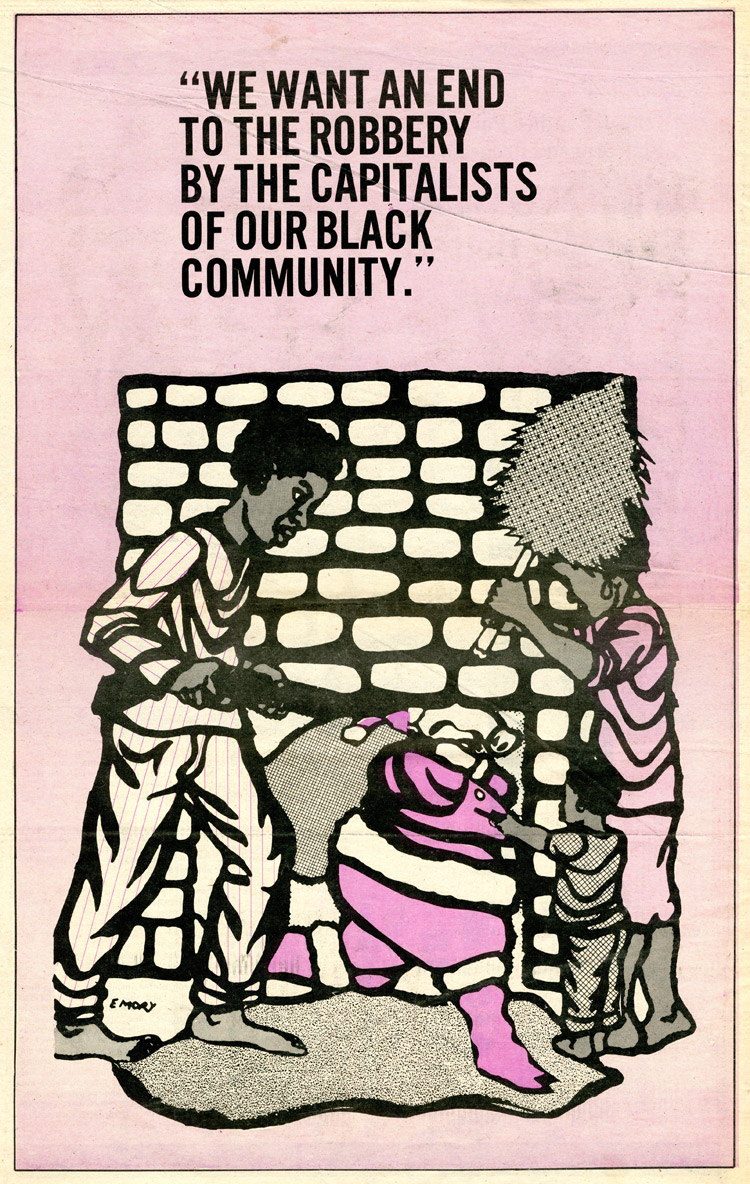
Image c/o Babylon Falling
The Panthers seemed somewhat prescient for an age of social media because they were really good at public relations, and also of cultivating an aesthetic and having a newspaper, which is something that other groups like the Young Lords found important to develop. So I’m wondering if that is another aspect of the renewed interest, though the social media environment might make this difficult.
Possibly. But it might not be a newspaper. Maybe it’s a clearinghouse place where activists agree that we are going to co-post on a common site and there is room for organizational disagreement between different viewpoints. There are places like The Root, that obviously has more mainstream parts, but also parts that are more movement-oriented. It covers a pretty broad swath of black politics and discussion.
I think that if you ask 100 young activists where they would look to keep up on where the real action was happening, I think you’d get maybe not 100 different answers, but at least 20 or 30 without any clear concentration. In part that may go back to the organizational question we talked about earlier. In part that may be a reflection of the fact that there isn’t an organizational center of the movement. For example, if Black Lives Matter was really to be as influential as the Black Panther Party was, then they would have to have both the resources and attention for their website to be that central hub. But certainly as an organization, Black Lives Matter isn’t yet playing the kind of role that the Black Panther Party played. But if they achieve that level of influence as an organization, perhaps their website would become as influential as the Black Panther newspaper.
But I want to say something about the issue of style, because that is a separate issue, and that’s the part I think you have wrong. It is also something I’m very critical about in The Black Panthers: Vanguard of the Revolution. You maintained that Cornel West had said we have to pay attention to the politics of the Party. I wasn’t there and I haven’t spoken with him about this, so I’m not sure if he was intending this as a critique or not. But he very well may have been, and that is the critique that I have shared with Stanley Nelson. That movie puts way too much emphasis on style and really elides the central question, which is why anybody cares about the Party in the first place, and that’s the politics. Yeah, the Panthers were doing some stylish things, but they really weren’t unique or original in any of that. The black berets and the black leather jackets, that wasn’t the Party’s breakthrough, other people were doing that. Mark Comfort and the other folks he was running with were doing it in Oakland. And there were all kinds of cool looks in the wider Black Power movement. So I think to think that that’s what drove the party’s success is disrespecting the history and not taking it seriously. It was cool and an important part of what was happening, but it wasn’t what drove people to the Party.
There were all kinds of problems with the Party, and we point out lots of those things in the book, but I think at a fundamental level, people go to church because they want to connect with God and a deeper purpose. And people join radical movements and risk their own personal situations because there are characteristics of their life that they don’t feel like they can live with, and they can feel much better about themselves if they spend what energy and effort they have to challenge and transform those things. I think at a fundamental level, that’s the first thing for understanding the Party. The Party was about people trying to challenge the oppressive conditions that they faced and not being able to do it alone.
So why did people go to the Party? They went to the Party because they thought it was going to work. It’s really pretty simple. Did they think it was going to work because they had sexy hats and colored blue shirts? No, that’s ridiculous. They thought it was going to work because they were standing up to the police and lived to tell the story about it instead of ending up dead or in prison. That’s the fundamental story about the Party and I think that the movie does a disservice to. The movie does touch on the politics and brings a lot of powerful voices to correct some of the mythology. But I think the greatest weakness of the movie is that it doesn’t seriously discuss the politics of the Party. The movie makes way too much of the style of the Panthers, as if this was just some kind of cool fashion club and that’s why all these people risked their lives. If that was the case, then why did the federal government—not just J. Edgar Hoover, but Nixon, the NSA, all these federal agencies—wage a coordinated war to destroy the Black Panther Party? Because they were cool? That’s ridiculous.
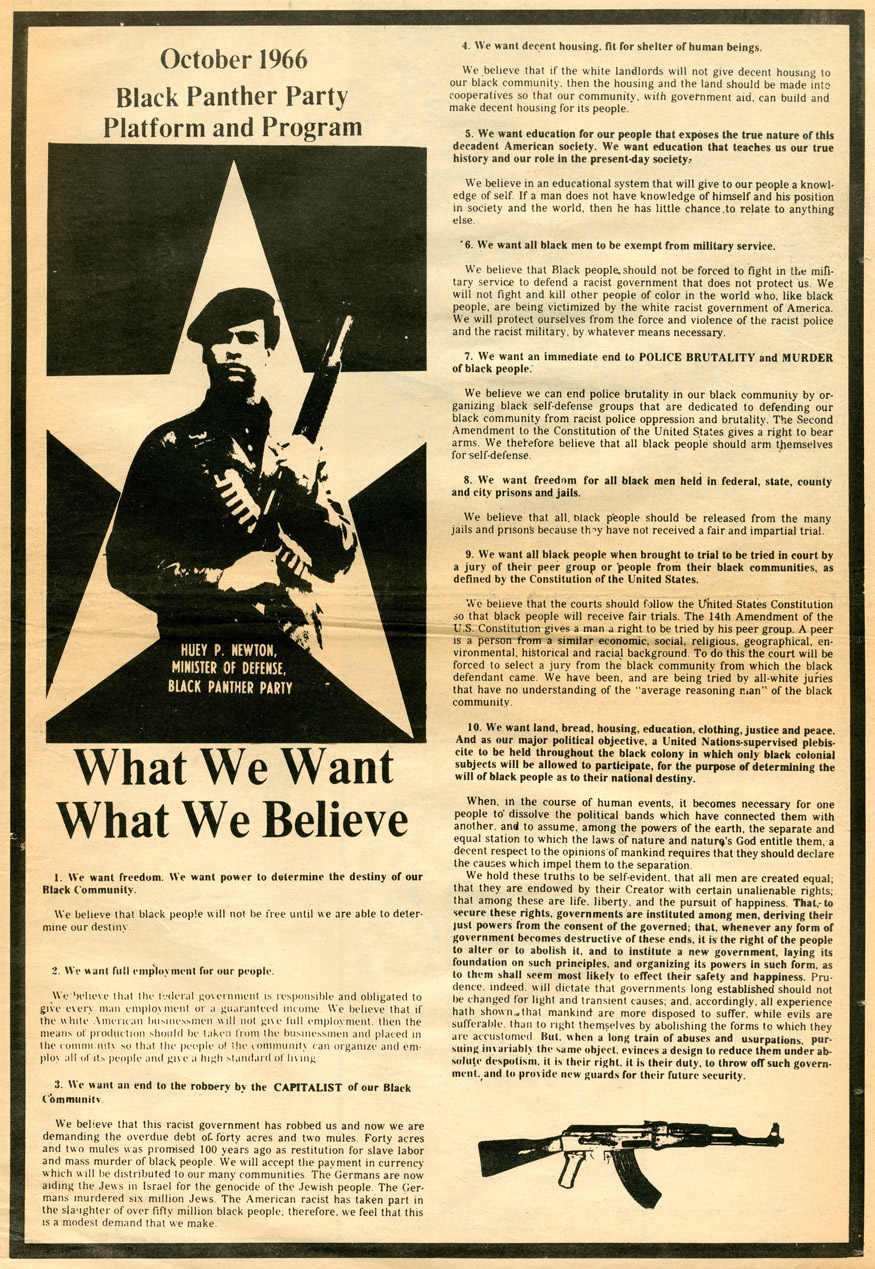
Image c/o Babylon Falling
That’s one aspect of the book that I really appreciated. The aspect of state repression is accentuated in a way that I think cuts through the misrepresentations of the Party. For example, my father, who was contemporaneous with the Party, thought that while maybe the Panthers were righteous in their politics, he also had the impression that they were a little dangerous. And this is in part because he was subject to that kind of coordinated misrepresentation and vilification of the Party at the time, and the persistent distortion of their legacy that persisted for a long time after. In a way I read this kind of repression as an aspect of Cold War history in the United States. Do you want to say something about the role of repression in understanding the Party?
Anybody who knows much about the Party recognizes that there was intense repression. There are several levels on which the repression story is really important and people get it wrong. It goes back to the conversation we were having about insurgent practice, and what people were doing. You have to assume that when you make business as usual impossible, authorities invested in the established social institutions that you are disrupting are going to repress you. And that is what the state is, that is what the state does. It keeps people in accord along the lines of the established order of society by repressing people who challenge those relations.
So when you use disruption as a source of power you can expect repression. I think that what the Party did was to create a form of practice that was really hard to repress at the time. That is what all movements necessarily must do if they seek use disruption as a source of power for change.
A lot of what I’ve been trying to figure out, both in Black Against Empire and more recently, but it’s implicit in every page of Black Against Empire and made explicit in the introduction and especially the conclusion, is the relationship between what people are doing and the context in which they are doing it which makes disruption sustainable as a source of power. It has to do with much broader social cleavages.
There are never going to be that many people who take the risk of disrupting business as usual. The risks are so dangerous. The more disruptive, the more dangerous, so there’s never going to be that many people who are going to take the risk. There weren’t that many people who violated Jim Crow in the Civil Rights Movement. There were millions of supporters, but there weren’t that many people that got their heads bashed in and really paid those repressive costs. What made the disruption of the Civil Rights Movement sustainable was that the more the state brutalized the civil rights protesters, the more liberals, and moderate black organizations and the federal government were threatened and embarrassed by that repression and had to jump in. And the same is true in the case of the Black Panther Party. If it weren’t for the fact that there were lots and lots of moderate black folks who could not get their kids into elite universities, who could not get access to good middle class jobs, who were excluded from the middle class and could not get political representation, who basically did not have institutional recourse—if that was not the situation then you wouldn’t have had folks like Willie Brown or even people like Whitney Young from the Urban League turning out to protest and mobilize and organize and redress the repression of the Black Panther Party. Moderate black political leaders had to resist repression of the Black Panther Party because they didn’t have institutionalized channels to redress their grievances. When the government kills Fred Hampton in his bed and stages armed raids of party offices around the country knowing that people are going to die, it threatens moderate black organizations because they have little institutional political recourse to address their broader grievances.
Similarly, 80% of Democrats vote in 1968 to end the war in Vietnam, they vote for anti-war candidates, and LBJ steps down. In Chicago it’s not just what happens in the street with Daley sending the orders to beat up the protesters. Inside the convention the party pushes through a pro-war platform and a pro-war candidate against the wishes of the voters, against the Democratic constituency. There is no institutional outlet for getting people’s issues addressed. In that context the Panthers have common cause with the anti-war movement. A lot of anti-war Democrats did not support the Black Panther Party, but even folks like your dad would feel pretty threatened when Chicago police, working with the FBI, shot Fred Hampton in his bed.
So the repression of the Party didn’t work. Look at the periods of the heaviest direct repression in ’68, ’69, and into ’70. Those are the years that the Party grows. The harder the state came, the more the Party grows. What happens after is complicated. There’s all kinds of internal processes as well, and weaknesses, and whatever, but what you see is it’s not just the Party, but all revolutionary black organizations fall. You can’t blame the quirks inside the Party. And if you look at the way this developed and the way the antagonisms in the Party developed, they developed very clearly as the Party got bigger and the state was doing this heavy repression. At the same time there were also all kinds of concessions being made. First it’s Affirmative Action programs and integration of police departments. Black folks are getting elected and incorporated into political machines. They are getting access to higher education. The black middle class is starting to grow. And similarly, there’s a rolling black of the Vietnam War and the draft. Nixon comes in hardline, but at the same time he is one that is rolling back the draft, so the anti-war movement is getting much more mellow through ‘69 and into ‘70. What happens with Cambodia is that the lie of Vietnamization and American withdrawal is exposed. Nixon says “we’re winding things back” and then it turns out that he is bombing Cambodia. But the draft numbers are very real. Very quickly, very starkly, Nixon turns back the draft. And that is not just because he’s a good guy, it’s because he cannot maintain political stability.
Don’t get me wrong. I’m not saying that this is just the Black Panther Party. I’m not saying that the Black Panther Party alone forces Nixon to repeal the draft. There’s all kinds of people who are mobilizing against the draft, and there’s all kinds of people who are starting a whole range of movements, from the women’s movement to the environmental movement, to draft resistance, and the Party is an important part of that mix. So the Party helps create social destabilization in that period of the late 60s which makes business as usually impossible, not just in an immediate sense, but in a way that the harder you repress the Party, and the harder you repress the anti-war activists, the more those movements grow. So concessions have to be made.
Affirmative Action doesn’t happen during the Civil Rights Movement or in response to the Civil Rights Movement. Affirmative Action happens in the late 60s, into the 70s in-part in response to the Black Panther Party. You have integration of police departments. You have access to higher education. You have all these kinds of changes. Can the Party take some kind of singular responsibility for that? No. But can you understand those changes, historically, without understanding the evolution of Black Nationalism and the party in specific? No, I don’t think you can.
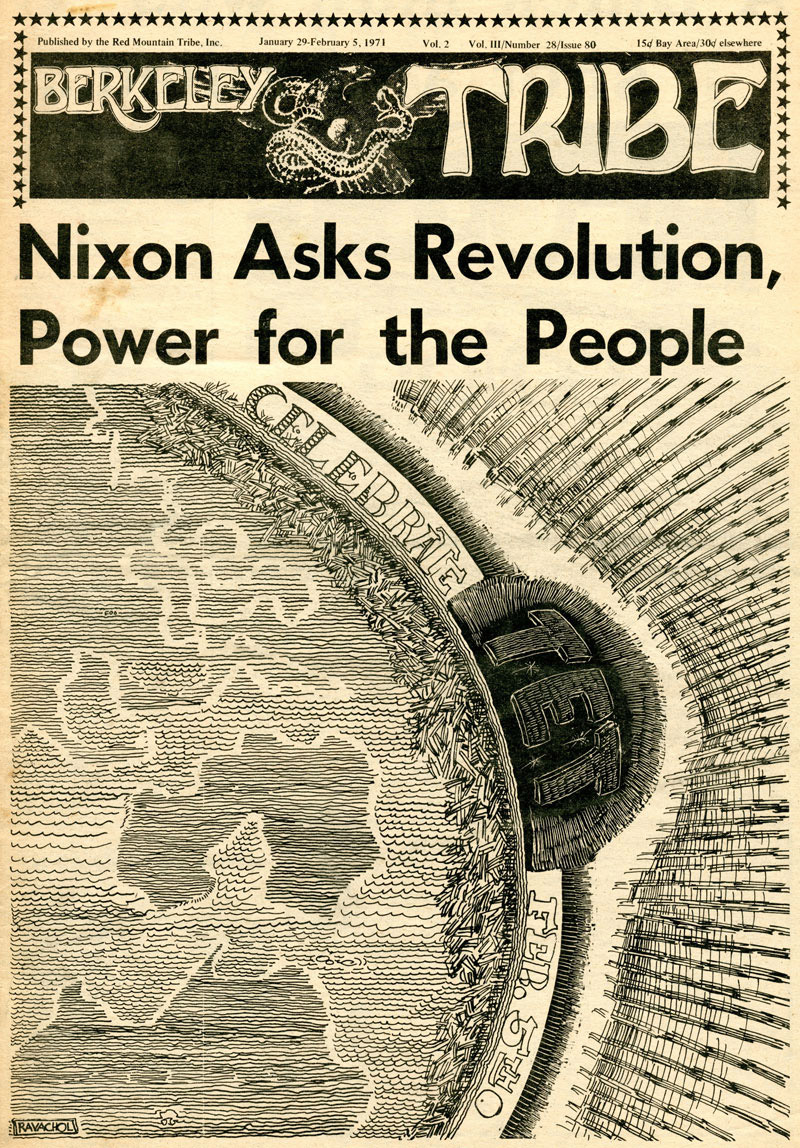
Image c/o Babylon Falling
So let me summarize. Two main points, one about repression and one about concession. The first is that the Party is hit really hard by the state, repression is intense. But the more intense and direct the repression is—because the Party has developed this cultural technology of insurgency—the more it grows. That’s the first point. To put it in more technical language, repression doesn’t work because the Party leverages much broader institutional cleavages. The Party leveraged the cleavage between black America and those striving to maintain white privileges following the dissolution of Jim Crow. The Party also leveraged the cleavage between a war machine that demanded the ultimate sacrifice and many Americans who did not see the Vietnam War as serving their interests. So there are these much broader social conflicts, and the Party puts itself right in the middle of those fights.
The other point is that the Party has a tremendous impact because the state is compelled to make far reaching concessions to undermine the Party and defuse the broad social upheaval of which it is a part. Not direct concessions to the Party, but concessions to the allies. Vietnamization, the repeal of the draft, and Affirmative Action re-stabilize society and undercut the threat to established authorities that those movements, including the Party, pose.
Michael Schapira is the Interviews editor at Full Stop and teaches Philosophy at Hofstra University.
This post may contain affiliate links.





